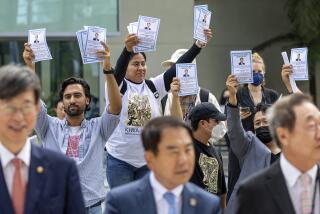RIOT AFTERMATH : COMMENTARY: BLACK, WHITE, ASIAN PERSPECTIVES ON THE RIOTS
- Share via
“Apparently the Rodney King verdict has caused much anger as well as racial disputes among (the minorities). My heart goes out to the many Korean merchants whose businesses have been destroyed. I know the hurt (they) must be feeling . . . and the hopelessness they are experiencing.”
As I stared into the eyes of the Channel 7 reporter as he conveyed these simple words, disgust overwhelmed me. I found it quite ironic and almost amusing that he could actually comprehend the feelings while he himself was not a minority. It seemed almost blasphemous.
How could he possibly grasp or comprehend feelings of those whose lives were destroyed and yet be able to blame and criticize them in other portions of his report?
The truth behind the riots is not yet evident. I believe that when the truth does come out, we will have yet to face more intense problems. However, I believe that the problems among the minorities will be resolved.
Minorities will begin to make an effort to work together and not against each other once they realize the vital importance of accordance and the simple reality that they are all in the “same boat.”
But, before we do learn the truth and all the facts are released, it is important to acknowledge the cause of the feelings of the minorities that endorsed the riots. The Rodney King verdict was only the catalyst, not the principal causation.
The anger, frustration and trauma that minorities have faced for numerous decades and yet submissively kept inside was the cause of the acrimonious bursts of emotion. Maybe Caucasians wouldn’t have reacted to such extremes or in the same way, but they are inevitably different from minorities. They don’t go through what most minorities go through every day.
I am not condoning the looting and incendiarism that took place nor am I encouraging it. What they did was in no way right. I can only understand because I am also human. I understand what minorities go through. I know how it feels and how they feel, for I am a minority.
And so, I myself sometimes feel deprived. It doesn’t matter that I am an American citizen and that my family “buys American.” It doesn’t matter that I am very fond of Caucasians and that a vast majority of my close companions are white. It doesn’t matter that America is my pride and my joy and that I would even die for this country.
I still have black hair, slanted eyes and yellow skin. I am a Korean, an Asian, a minority . . . My nationality and ethnic background should be something to take great pride in, not something to be penalized for. It has become an issue.
Why should I be weary or afraid to proclaim that I am a Korean? Because of the problems, I may face being associated with the stereotypical Koreans that people have created or the past mistakes or misinterpreted actions of individuals who were Korean?
In the case of Latasha Harlins and the grocer, why did the fact that the grocer was Korean have to become a nationwide issue? Why do incidents have to be labeled with ethnicity? Not once have I heard “the grocer.” It has always been “the Korean grocer.” Why should race become a major factor? Why should I have to be associated with another human being’s actions whether right or wrong?
One day, I was in the parking lot of Bristol Farms. A man pulled up abruptly beside me. He rolled down his window, spat, and yelled at me to go back to “my country.” (However, he didn’t use such unadorned words.)
I stood there in complete disbelief. Wasn’t this my country? One nation, under God, indivisible, with liberty and justice for all? This is MY country just as much as it is his.
Then, in much humility, I corrected myself. This really wasn’t MY country. I am not an Indian. But neither was he.
More to Read
Sign up for Essential California
The most important California stories and recommendations in your inbox every morning.
You may occasionally receive promotional content from the Los Angeles Times.













